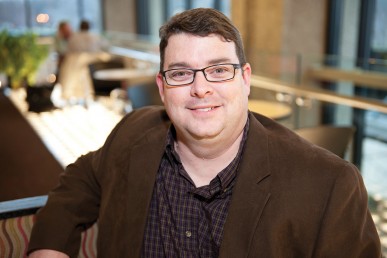Ben Whisenhunt gives CoD students a global perspective

Ben Whisenhunt, a history professor at the College of DuPage who received his Ph.D. from UIC, takes his students on field trips to Russia.
Photo: Roberta Dupuis-Devlin/UIC Photo Services
Take a history class from Ben Whisenhunt and you could end up in Russia.
Whisenhunt, a ’97 UIC Ph.D. who’s a history professor at the College of DuPage, has taken his students to Moscow and St. Petersburg in 2008, 2010 and 2012.
The next field trip, in 2014, will be “a little more adventurous” — to Siberia, which he visited two years ago.
“Siberia is very different from Moscow and St. Petersburg, which are very westernized,” he said.
“It’s remote, has fewer accommodations and is a little more rugged. You don’t get a lot of tourists.”
Whisenhunt has also taught Russian students. As a Fulbright scholar in 2006, he lectured on American history to students who were on their way to becoming translators and interpreters.
“I started out speaking slowly, in incomplete sentences,” he said. “Finally someone said, ‘That’s not the way you usually speak, is it?’
“I speak pretty fast. So I started talking the way I normally do, and they kept up.”
Publishing under his full name of William Benton Whisenhunt, he edited and wrote an introduction for Marooned in Moscow: An American Woman Imprisoned in Soviet Russia.
Marguerite Elton Baker Harrison was a journalist and spy for the Military Intelligence Division, a predecessor of the CIA. She also spied in Germany near the end of World War I.
Harrison wrote and published Marooned in Moscow in 1921, soon after spending 10 months in a Soviet prison. “Then it fell off the map,” Whisenhunt said.
His work on a 2011 edition of the book includes footnotes on many of the people Harrison wrote about.
Whisenhunt is co-author of A Russian Paints America: The Travels of Pavel P. Svinin, 1811-1813.
Russia and the United States had recognized each other in 1807, and Svinin was part of the first Russian delegation to this country.
He wrote about slavery, religion, the natural environment, Native Americans and politics. He was also a painter of watercolors — 31 of them are in the book.
Whisenhunt wrote a book related to his Ph.D. dissertation, In Search of Legality: Mikhail M. Speranskii and the Codification of Russian Law.
He co-edited another book, Russian and Soviet History: From the Time of Troubles to the Collapse of the Soviet Union.
Whisenhunt is working on a book about three dozen American surgeons who served as volunteers on the Russian side in the Crimean War of the mid-1850s.
“Russia didn’t have enough surgeons, and a lot of surgeons sought out [the battlefield] so they could practice their skills,” he said.
Whisenhunt is co-founder and co-chair of the Russia Committee at the College of DuPage. “We bring in speakers on all kinds of Russian topics,” he said.
He has served about 10 years on a panel of the Illinois Articulation Initiative, which builds links between colleges and universities to benefit transfer students.
This boils down to “if you take a course here, will it be counted there?” he said.
Whisenhunt attributes his specialization in Russia to “fascination with its culture and people.”
As a high school student, he heard Russia characterized as the “evil empire” by President Ronald Reagan.
“I was thinking that people can’t be as bad as he says they are,” Whisenhunt said.
At Cornell College in Iowa, where he earned a bachelor’s degree in history, he learned to speak and read Russian. He went on to receive a master’s from the University of Nebraska at Omaha, then his Ph.D. from UIC.
“I defended my dissertation in July ’97 and started at the College of DuPage in the fall,” he said.
Whisenhunt was born in Kentucky but lived there only one year. He spent four years in Pennsylvania, four in New Mexico, six in Texas and three in Nebraska before finishing high school.
His father was a history professor who later became a dean and interim college president.
Whisenhunt lives in Sycamore with his wife, Michele, an elementary school librarian, their daughter, Meredith, 17, and son, Matthew, 14.
He loves travel, “wherever I can possibly go.” He’s been to Russia eight times and taken his family on vacations to Wyoming and Colorado in recent years.
“Somebody once asked me ‘Why did you go to Armenia?’ and I said, ‘Because it was there,’” Whisenhunt said.
“The world is kind of a big place, and I need to see more of it.”
